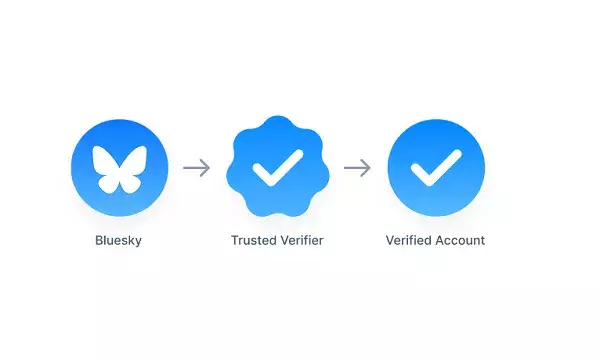In a rapidly evolving digital landscape, the need for authentic voices on social media platforms has never been more pronounced. With misinformation and impersonation rampant, Bluesky’s recent introduction of in-app verification checkmarks represents a significant step towards fostering trust. This new system not only allows users to distinguish between verified accounts and impersonators but also encourages organizations and notable individuals to establish their credibility. As Bluesky expands its verification process, it provides a unique model that could change how we interact with and perceive social media platforms altogether.
A Novel Perspective on Verification Ticks
Bluesky is pioneering a distinctive method for validating accounts through its checkmark system. Unlike traditional blue ticks, which are usually a sign of universal recognition, Bluesky employs a rounded marker that mirrors its own logo. This artistic choice reflects the platform’s ethos: unique, modern, and distinct from conventional social media giants. The introduction of star-like checkmarks for “trusted providers” like established media outlets adds another layer to the verification process, allowing reputable organizations to authenticate their employees independently. This not only decentralizes the verification process but also alleviates the burden on Bluesky itself. Organizations can focus on their own standards and criteria for authenticity, creating a multifaceted approach to trustworthiness online.
Challenges and Implications of Notability
The concept of “notability” in Bluesky’s verification system is particularly intriguing yet contentious. The platform stipulates that individuals seeking verification must be recognized within their field and region, raising questions about who determines this recognition. Is it mainstream media attention, or can it also encompass niche influencers with specialized followings? The answer seems to be fluid, as it is still up for interpretation by Bluesky and its user community. As a result, the fluidity of “notability” could lead to discrepancies in what is deemed a credible account.
Furthermore, this raises an ethical dilemma: the potential for verification to be doled out based on arbitrary criteria that could unwittingly favor certain voices over others. Organizations may struggle to agree on who within their ranks should receive verification, which could lead to internal disputes and public confusion about the perceived value of checkmarks. The challenge for Bluesky remains ensuring that their verification process remains transparent, fair, and, most importantly, consistent.
Trust in the Age of Identity Verification
Bluesky’s initiative to incorporate identity verification into its system speaks to a wider trend within social media of prioritizing user safety. As modern interactions become increasingly digitized, establishing genuine identities becomes paramount to maintaining an ecosystem where trust can thrive. However, Bluesky has stated that applicants will not receive feedback unless their requests are approved, keeping users in the dark about the reasoning behind approval or rejection. This approach could simplify the process but may also lead to frustration, especially for users eager for clarity on their verification status.
Despite these potential pitfalls, it’s essential to recognize the intent behind these efforts: to create a safer online community where impersonation is significantly reduced and credible information is prioritized. By aiming for a clear delineation between verified accounts and impersonators, Bluesky can cultivate an environment where users feel secure and correctly informed.
Bluesky’s expansion of its verified user system is an ambitious undertaking that reflects the platform’s desire to innovate within the social media space. By focusing on decentralized verification and the nuanced concept of notability, it is poised to challenge traditional norms and inspire a more trustworthy digital communication landscape. While challenges undoubtedly loom ahead in its execution, Bluesky’s efforts signal a promising shift towards a more responsible and authentic use of social media that extends beyond mere verification – it fundamentally reshapes how users are perceived online, potentially setting new benchmarks for platforms to follow.

